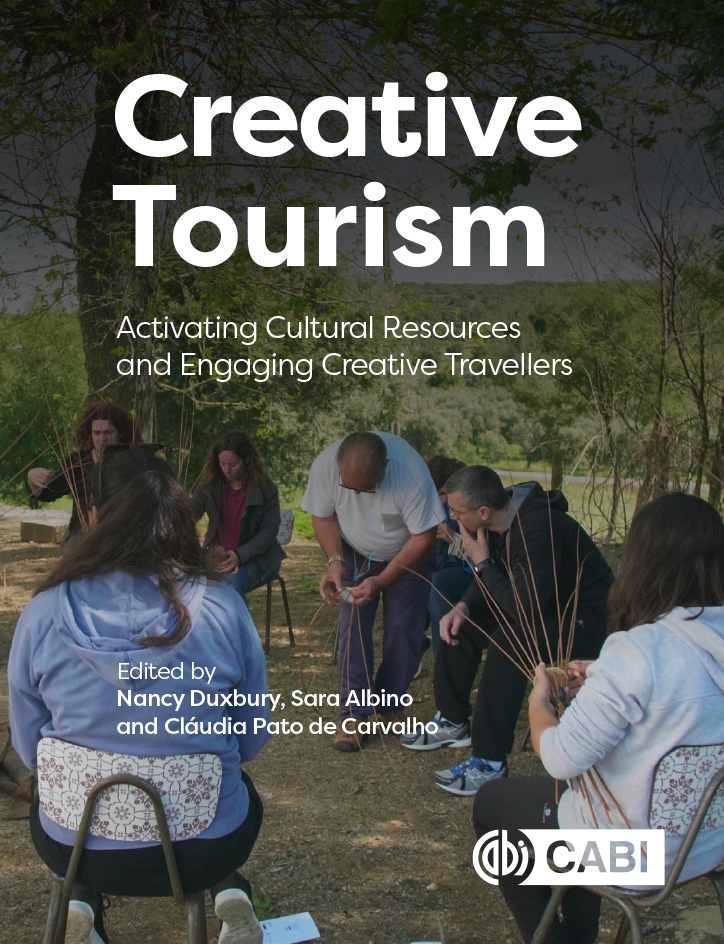Book
Creative Tourism. Activating Cultural Resources and Engaging Creative Travellers
Editors: Nancy Duxbury, Sara Albino, Cláudia Pato de Carvalho | CABI, 2021
Overview
This book provides a synthesis of current research and international best practice in the emerging field of creative tourism. Including knowledge, insights, and reflections from both practitioners and researchers, it covers types of creative tourist, trends, designing and implementing creative tourism products, embedding activities in a community and place, and addressing sustainability challenges. Applying lessons learned from the CREATOUR project and other initiatives, the editors present key information in an actionable manner best suited to people working on the ground.
The book:
- Addresses important issues such as local economic benefit, social and collaborative economy, community engagement, social inclusion, youth empowerment, cross-cultural exchange, and responsible travel.
- Provides a core, introductory text plus a wide range of cases examining creative tourism development in practice in the following 15 countries: Austria, Brazil, Canada, Colombia, Denmark, Finland, Kenya, Namibia, Portugal, the Netherlands, New Zealand, Slovenia, Spain, Thailand, and the USA.
- Includes colour photos, diagrams, text boxes, and call-out quotations throughout to help guide and engage readers.
A vital resource for tourism agencies, practitioners, planners and policymakers interested in developing creative tourism programmes and activities, this book will also be of interest to cultural and creative tourism researchers, students, and teachers of tourism and culture-based development.
About the editors
Nancy Duxbury, PhD, is a Senior Researcher at the Centre for Social Studies, University of Coimbra, Portugal, and Co-coordinator of its Cities, Cultures and Architecture Research Group. She is also an Adjunct Professor of the School of Communication, Simon Fraser University and of the School of Urban and Regional Planning, University of Waterloo, Canada. She is a member of the European Expert Network on Culture, and was Chair of the Policies group of the European research network “Investigating Cultural Sustainability” (2011-2015). Previously, she was co-founder and Director of Research of the Creative City Network of Canada.
Her research has examined the integration of culture in local sustainable development, with an emphasis on the policy and planning frameworks that enable this; culture-based development models in smaller communities; and the emerging interdisciplinary field of cultural mapping, which bridges insights from academic inquiry, community practice, and artistic approaches to understanding and articulating place. Building on these foundations, she is now the Principal Investigator for a major three-year research and application project on creative tourism in Portugal, entitled “CREATOUR: Creative Tourism Destination Development in Small Cities and Rural Areas.” The project involves five Portuguese research centres and 40 pilots, and aims to link the cultural and tourism sectors within a context of inclusive and sustainable local and regional development.
She was born in Canada, and lived on both the Atlantic and Pacific Coasts of the country before moving to Portugal in 2009. She currently splits her time between Coimbra and São Miguel Island, Azores.
Sara Albino, PhD is a Research Fellow of the Interdisciplinary Centre of History, Culture and Societies of the University of Évora and also a Member of the UNESCO Chair in “Intangible Heritage and Traditional Know-How: Linking Heritage” (University of Évora – Portugal). She is also an associate researcher at the Research Centre in Fine Arts of the University of Lisbon. Her research has addressed the issue of immaterial heritage in tourism planning and territorial branding using mixed methods in qualitative research. Presently is involved as a researcher in the action-research project CREATOUR- “Creative Tourism Destination Development in Small Cities and Rural Areas”.
As a community outreach practical project, she is the co-founder of Buinho Creative Hub, the Rural Fablab of Baixo Alentejo with its children’s makerspace in the Primary School of Messejana. Based on her experience of creating one of the first artistic residencies program in fablab environment of Europe, she has been currently examining the profile and impacts of creative travellers and creative hubs development in rural areas.
Claudia Pato Carvalho is a permanent researcher at the Centre for Social Studies of the University of Coimbra under the ARTERIA project (operation no. CENTRO-07-2114-FEDER-000022, Portugal 2020). Arteria is an action-research project, coordinated by O Teatrão (a professional theatre company from Coimbra) that aims at the development of a cultural programming network in the Centro Region (Portugal) and the creation of artistic intervention projects in eight cities of this Region. She completed her PhD in Sociology, with a specialization in Sociology of Culture, Knowledge and Communication, at the Faculty of Economics of the University of Coimbra, in collaboration with the Center for Reflective Community Practice (DUSP, MIT). Between 2010 and 2018, has established an European network in the field of arts education and disadvantaged communities, with several projects approved under the Youth in Action Program and ERASMUS+.
She is member of the coordinating CES research team of the project CREATOUR: Creative Tourism Destination Development in Small Cities and Rural Areas. CREATOUR is an incubator/demonstration and multidisciplinary research initiative, supporting collaborative research processes involving five research centres working with a range of cultural/creative organizations and other stakeholders located in small cities in the Norte, Centro, Alentejo and Algarve regions.


